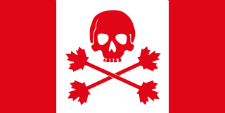 The International Intellectual Property Alliance (IIPA) has just published its latest submission to the U.S. Government, accusing it of providing a home to many pirate sites.
The International Intellectual Property Alliance (IIPA) has just published its latest submission to the U.S. Government, accusing it of providing a home to many pirate sites.
This includes the recently shut down isoHunt.com as well as other popular torrent sites such as torrentz.eu and kickass.to.
“Even after the shuttering of Isohunt, Canada is still the home to some of the world’s most popular Internet sites dedicated to piracy, including torrentz.eu and kickass.to, which garnered rankings of third and second place, respectively, on one of the most widely accessed listings of the world’s most popular illicit BitTorrent sites,” IIPA writes.
The copyright holders further mention the linking sites cuevana.tv, free-tv-video-online.me, and solarmovie.so as having Canadian connections, as well as the smaller torrent sites fenopy.se and monova.org. Without proper enforcement action against them, Canada remains very attractive to these allegedly infringing sites, they claim.
“It is hard to avoid the conclusion that Canada remains a magnet for sites whose well-understood raison d’être is to facilitate and enable massive unauthorized downloading of pirated versions of feature films, TV shows, recorded music, entertainment software, and other copyright materials,” IIPA writes.
“The largest of these Canadian-hosted sites attract scores of millions of unique visitors every month, and their corrosive effects on legitimate markets are felt worldwide,” they add.
The United States should encourage Canada to take action against these sites, the industry groups recommend. Without proper action the country will not just remain a safe haven for infringing websites, but also a breeding ground for new generations of Internet pirates.
According to the IIPA, current policies have resulted in widespread piracy among Canadian Internet users, with instances twice as frequent as in the United States.
“In this environment, it is not surprising that Canadians continue to demonstrate a formidable propensity to patronize illegal online sources of copyright material, thus stunting the availability and growth of legal alternatives,” IIPA writes.
“A report released in September 2012 found that, on a per-capita basis, Canadians download more unauthorized music than residents of any other country, and two-and-one-half times as much as Americans,” the groups add.
“Canadians continue to demonstrate a formidable propensity to patronize illegal online sources of copyright material, thus stunting the availability and growth of legal alternatives.”
The industry groups further recommend that Internet providers should partner with copyright holders to tackle the ongoing piracy problems. While some ISPs already forward infringement notices to their customers, they note that repeated infringers go unpunished.
Due to this “glaring weakness” the current copyright infringement warnings sent out by some ISPs are not believed to be very effective.
“Although more and more notices of infringement are sent by right holders and forwarded by service providers to their customers each year, the providers do not even correlate the notices with individual subscribers to know which are repeat infringers,” IIPA writes.
“To treat the first-time violator identically with the serial offender jeopardizes any deterrent effect the notices might otherwise achieve,” they add.
The groups recommend that the U.S. Government urges Canada to implement “strong legal incentives” for local ISPs to take action against these persistent pirates by teaming up with copyright holders.
The above is just the tip of the iceberg for Canada. Among other things, the groups also call for stronger border protections and hefty jail sentences for copyright infringers.
This is not the first time that Canada has been called out on copyright. Based on similar recommendations the U.S. Government has placed its northern neighbor on the intellectual property watch-list for several years in a row.
The IIPA’s full 2014 Special 301 recommendation report is available here. This also includes assessments from more than two dozen other countries, including Argentina, Brazil, China, Italy, Russia, Spain and Switzerland.
Photo: Sébastien Launay





